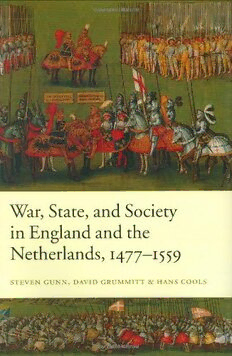
War, State, and Society in England and the Netherlands 1477-1559 PDF
410 Pages·2008·4.206 MB·English
Most books are stored in the elastic cloud where traffic is expensive. For this reason, we have a limit on daily download.
Preview War, State, and Society in England and the Netherlands 1477-1559
Description:
Exploring the effects of war on state power in early modern Europe, this book asks if military competition increased rulers' power over their subjects and forged more modern states, or if the strains of war break down political and administrative systems. Comparing England and the Netherlands in the age of warrior princes such as Henry VIII and Charles V, it examines the development of new military and fiscal institutions, and asks how mobilization for war changed political relationships throughout society.Towns in England, such as Norwich, York, Exeter, and Rye, are compared with towns in the Netherlands, such as Antwerp, Leiden, 's-Hertogenbosch and Valenciennes, to see how the magistrates' relations with central government and the urban populace were modified by war. Great noblemen from the Howard and Percy families are set alongside their equivalents from the houses of Cro and Egmond to examine the role of recruitment, army command, and heroic reputation in maintaining noble power. The wider interactions of subjects and rulers in wartime are reviewed to measure how effectively war extended princes' claims on their subjects' loyalty and service, their ambitions to control news and opinion and to promote national identity, and their ability to manage the economy and harness religious change to dynastic purposes. The result is a compelling but nuanced picture of societies and polities tested and shaped by the pressures of ever more demanding warfare.
See more
The list of books you might like
Most books are stored in the elastic cloud where traffic is expensive. For this reason, we have a limit on daily download.
